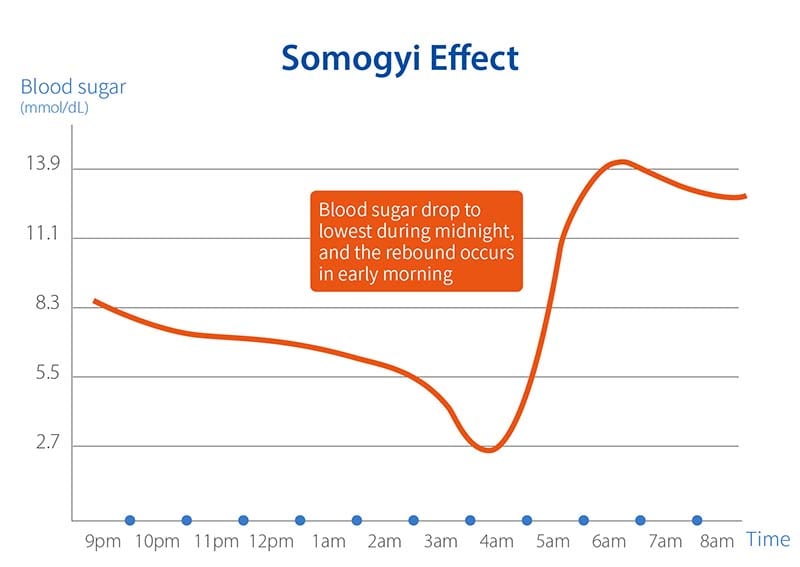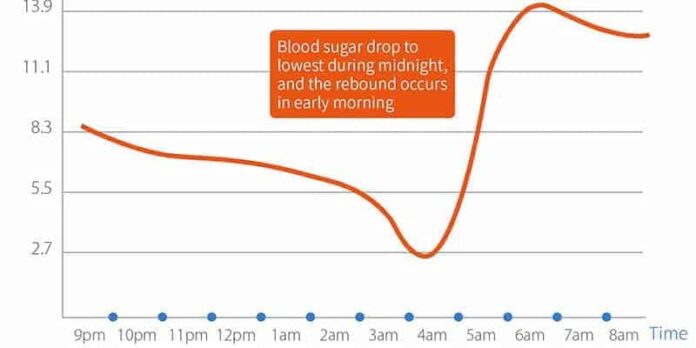There is a lengthy list of things that can easily spike your blood sugar, but the Somogyi Effect might be one of the strangest.
Let’s take a closer look at what Somogyi Effect really is and how to handle it if it happens to you.
What is the Somogyi Effect?
The Somogyi Effect is when you experience a severe low blood sugar followed by a significant spike — that you don’t notice until you wake up — during your sleep.

During the Somogyi Effect, the severe low blood sugar occurs without waking you from a deep sleep. Then your liver responds by releasing stored glycogen and breaking it down into glucose to bring your blood sugar back up to a safe level.
What you’ll notice as the person experiencing it is simply going to bed with a blood sugar that isn’t low, and waking up with a very high blood sugar — generally above 250 mg/dL — without any clear explanation for the spike.
This is your body’s self-protection. But it only occurs when the low blood sugar is severe enough to trigger that dump of glycogen from your liver.
This physiological glycogen “backup plan” can also occur at other times of day but Somogyi Effect refers specifically to the severe low and rebounding high that occurs while you sleep.
What causes a Somogyi Effect to occur?
In short, it’s the result of getting more insulin than your body needed in combination with other variables.
- Too much insulin taken shortly before or after exercise
- Too much insulin taken with food
- Too much insulin to correct a high blood sugar
- Taking insulin but forgetting to eat
- Taking a non-insulin medication that lowers blood sugar
- A malfunction in your insulin pump
- Accidentally taking the wrong dose/type of insulin
Just as you juggle the many variables of blood sugar management all day long, the Somogyi Effect is one of the more severe consequences of extreme blood sugar fluctuations.
Keep in mind that rapid-acting insulin stays in your body for about 4 hours, which means the insulin you took at 9 p.m. could lead to a severe low blood sugar at midnight or 1 a.m.
This blood sugar and insulin juggling act isn’t easy!
If you think you’ve experienced the Somogyi Effect…
Unfortunately, there are many things that could cause a high blood sugar in the morning.
Pinpointing the many variables that might have affected your blood sugar isn’t simple, and the Somogyi Effect probably (and hopefully) isn’t happening to you over and over without you waking at some point during the night due to normal symptoms of hypoglycemia.
First, talk to your healthcare team or a diabetes educator about your concern and the potential Somogyi Effect.
Secondly, set an alarm for a few nights to wake up once or twice in the middle of the night and check your blood sugar.
Thirdly, share your blood sugar results with your healthcare team to pinpoint any evidence of the Somogyi Effect. This will help you then make adjustments in your insulin or other medications.
Lastly, if you’re not already using a CGM, start the conversation with your healthcare team. A CGM can immediately provide life-saving insight into blood sugar mysteries like this.
Other potential causes of morning high blood sugars
If your morning high blood sugars don’t seem to be the result of the Somogyi Effect, ask yourself if any of the following might be possible instead:
Too little basal/background insulin
If you’re experiencing severe high blood sugars in the morning regularly, chances are that this or one of the other variables below is the cause. You may actually just need a tune-up in your background insulin doses (via the basal rates in your pump or your long-acting insulin dose).
You might think, “Well, my weight is the same and my diet is the same, why would I need more insulin?”
Other variables can have a big impact, like: an increase in your daily stress level, a decrease in your activity level, or a new medication you’re taking.
Talk to your healthcare team about making adjustments in your basal/background insulin to prevent this recurring rise in your blood sugar levels.
The Dawn Phenomenon
“Dawn Phenomenon” can easily account for consistently spiking in the morning, often as soon as your feet hit the floor.
The cause of this recurring high blood sugar and insulin resistance is a healthy and normal part of the human body — hormones like cortisol, testosterone, and glycogen are all doing their job but inevitably call for more insulin, too.
Many folks simply take a small bolus of insulin to account for the blood sugar spike this causes. (Personally, I take 1 unit of insulin as soon as I wake up and check my blood sugar unless my blood sugar is low, then I usually let Dawn Phenomenon raise the low for me!)
Eating foods high in fat/carbohydrate in the evening
For example, while you may take enough insulin to technically cover the carbohydrates and fat in the pizza you ate last night at 8 p.m., the long-term effect of insulin resistance from high-fat foods can easily lead to a spike in your blood sugar the next morning when your big meal boluses wear off.
An easy solution for this is to increase your basal rates or take another small dose of rapid-acting insulin when you wake up in the morning.
Too little sleep
If you went to bed at 3 a.m. after a wild night out with your friends or staying up to study for your exams, your body isn’t going to thank you. Instead, it responds by producing more cortisol to compensate for the lack of rest it desperately craves. That boost in cortisol production can lead to stubborn high blood sugar levels all day long!
While we certainly can’t control every little thing that impacts our blood sugar levels, the Somogyi Effect is something you should be able to prevent once you have enough information to understand why it’s happening. It should be taken very seriously and addressed as quickly as possible.

